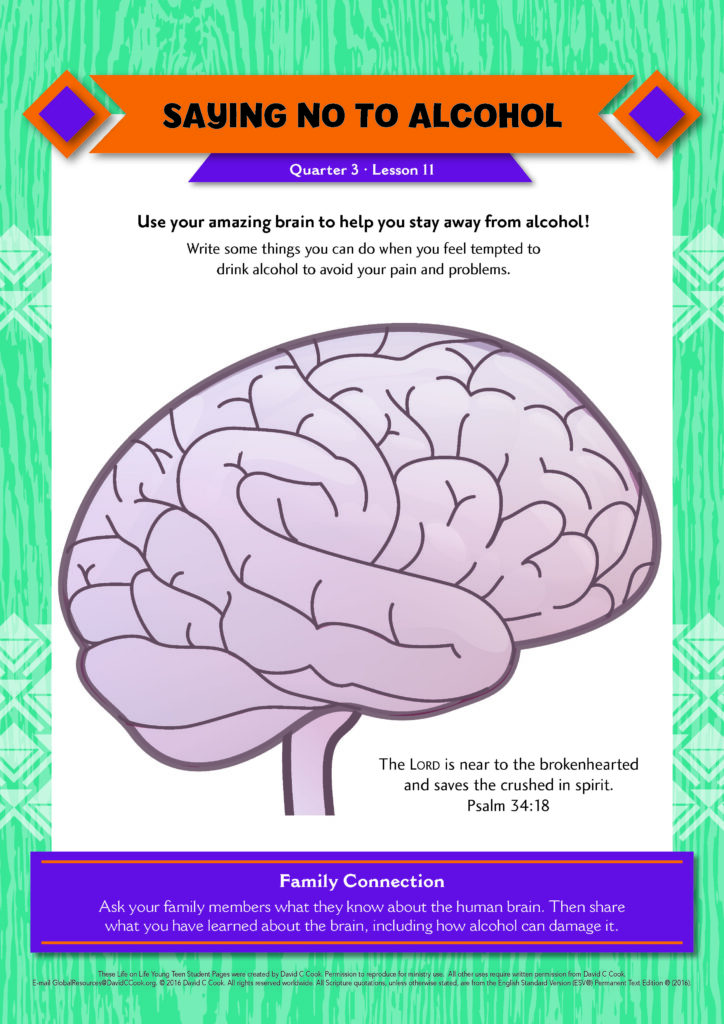During the lesson, the information for you to know is written in regular type, and what we suggest speaking or reading aloud to children is in bold. All resources for this lesson, including the Teacher Guide, Student Page, Family Connection Card, and other resources can be downloaded in a ZIP file by clicking on the following link:
In some lessons you will find "resource articles." These are articles written by experts from around the world to help equip you for your work with children and adolescents. Share them with parents or guardians if you consider it appropriate.
“My soul is overwhelmed with sorrow to the point of death. Stay here and keep watch with me.” Going a little farther, he fell with his face to the ground and prayed, “My Father, if it is possible, may this cup be taken from me. Yet not as I will, but as you will.”
Matthew 26:38–39
In Jesus’ darkest moment, He called on the ones He could trust. In His deep sorrow before His death, He turned to His friends and His Father for help. When you are sad, lonely, anxious, or weary, where do you turn? Many use alcohol to dull their pain and calm their anxiety. But we learn from Jesus’ example that there is a better place to seek comfort and strength. Our trusted friends can watch over and pray for us, and God’s healing love can help us to overcome our troubles.
As you prepare to teach this lesson, spend time drawing near to God. You can trust Him with the things that crush your spirit and break your heart. You can lean on Him for support in your times of trouble. When you call on Him, He is near. He will meet you wherever you are—even in your darkest moments.
Encourage the teens to ask their family members what they know about the human brain. The students can then share what they learned about the brain, including how alcohol can damage it. If possible, provide the families with copies of the Resource Article “Helping Teens Make Wise Choices about Alcohol.” The article can be found in this guide at the beginning of this unit.
Teacher Tip: If possible, email or text the Family Connection Card to the families of your students.
Welcome your students warmly. Ask them if they had any opportunities this past week to say no to temptations. Listen attentively to their answers. When you show your care for them and their lives, they will be more open to learning and sharing.
Have your students get into groups of 3. If you have a large class, make groups of 5–6. Show them the visual puzzle on the page at the end of this lesson. Allow them to decide on the answer in their groups.
Ask each group to tell you their answer. The correct answer is 16 squares. Clap for the group that either got the right answer or was closest to it.
Our brains are amazing! They control our thoughts, movements, memories, and decisions. Our brains allow us to solve puzzles like these. They are the nerve centres of our bodies. Our brains control almost everything we do—even the things we do not think about, such as breathing and digesting food. Though our brains are all physically similar, they are each unique because of the information we have stored in them.
Our brains are also the source of our emotions. Our brains collect sensory information, filter past experiences and knowledge, and process information to tell us how to react to the situations we are facing. Our brains then trigger our physical and emotional reactions.
Here are some fun and fascinating facts about your brain:
What is something new you just learned about your brain?
Allow 2–3 students to share their thoughts.
What kinds of things might damage your brain?
Allow students to share their thoughts.
One thing many people do to damage their brains is abuse alcohol. Let’s talk about some of the ways alcohol can affect your life—and your brain.
Here are some ways alcohol affects people’s bodies and minds:
Allow students to share their thoughts.
Allow students to share their thoughts.
Students may answer that they want to stay safe, stay healthy, be kind to others, or do well at work and in school.
Let’s see what the Bible says about becoming drunk on alcohol.
If possible have a student read Proverbs 23:29–39 directly from the Bible.
Who has woe? Who has sorrow? Who has strife? Who has complaints? Who has needless bruises? Who has bloodshot eyes? Those who linger over wine, who go to sample bowls of mixed wine. Do not gaze at wine when it is red, when it sparkles in the cup, when it goes down smoothly! In the end it bites like a snake and poisons like a viper. Your eyes will see strange sights, and your mind will imagine confusing things. You will be like one sleeping on the high seas, lying on top of the rigging. “They hit me,” you will say, “but I’m not hurt! They beat me, but I don’t feel it! When will I wake up so I can find another drink?”
Proverbs 23:29–35
Allow 3–4 students to share their ideas.
This person described in Proverbs 23 shows the effects of alcohol we discussed earlier. The person who gets drunk has a lot of pain and sorrow. He complains about everything. He is ready for a fight with anyone. He has bruises and does not remember how he got them. His eyes are red and bloodshot. He thinks alcohol looks good. It tastes good to him. But it ends up being like poison from a snake, making him sick. He sees things that are not real. He says crazy things. The drunk staggers around and cannot walk straight. He gets into unsafe and dangerous situations and does not realize it. After he wakes up, he knows someone has abused him, but he does not know what happened. He then seeks another drink.
Allow students to offer their thoughts.
Sometimes adults drink alcohol to celebrate an event or something good that happens. Some drink alcohol only occasionally or rarely. Drinking alcohol responsibly is popular in many cultures and may not result in these harmful effects.
However, some people misuse alcohol. They may drink alcohol out of curiosity or because they feel pressured by others. They may drink alcohol because everyone else does. They may drink alcohol because they want to feel the calming effects that alcohol brings. Some may drink alcohol because they have become addicted to it. But many people misuse alcohol because they are hurting and do not want to feel their pain. Alcohol can dull their emotions so they forget that they are lonely, sad, or scared—at least for a little while.
Guide the students to understand that alcohol will not solve their problems or take away their pain.
Misusing alcohol causes people to make choices that hurt themselves and others. Alcohol abuse damages relationships, puts the alcohol drinker and others in physical and emotional danger, and has serious health risks. Alcohol does not heal pain—it only makes it worse. But we can be healed from our pain and problems.
Students might say people can talk to their friends, family, teachers, or other trusted adults about their pain and problems. They can exercise or pray.
Here are some healthier choices you can make if you have deep pain that needs healing.
Have a student read Psalm 34:18 aloud from the Bible.
The Lord is close to the brokenhearted and saves those who are crushed in spirit.
Psalm 34:18
Allow 2–3 different students to share their thoughts for each of the following questions.
Students may suggest sad, lonely, depressed, or hopeless.
Students may answer that God is always close to us, even when we are sad.
Think about your life now and in the past. Have you ever felt brokenhearted or crushed in spirit? When you are brokenhearted, God can bring you peace and comfort. He cares about your problems and your pain. He will help you to heal—if you ask Him for His comfort.
When we are hurt, it is difficult to be strong. We have learned that we can ask God for strength when we are weak. When we are hurting, we want to escape from our pain and problems. Alcohol seems like an easy way to escape. But we can ask God to comfort us when we are hurting instead.
Select 3 volunteers. Quietly read the following situation to them or allow them to read it from your guide. Do not share it with the rest of the class. Tell the volunteers that, at the end of the role-play, Student 1 should pretend to drink the alcohol.
The sister of (name of Student 1) is very sick and will probably die next week. He is angry and hurt. He wants to escape from his pain. He knows 2 boys from school drink alcohol in the afternoons. He goes to find them. He thinks drinking alcohol may help to escape the pain he is feeling, but he is not sure.
(Names of Students 2 and 3) have been drinking alcohol for many months. They drink together nearly every day. They get poor grades in school and have lost nearly all of their friends. They are mean and angry most of the time—except when they are drunk. When they are drunk, they always have a great time. (Name of Student 1) finds them, and they offer him some alcohol.
Give the volunteers 3–4 minutes to act out the situation. In the discussion, use the names of the students who played the different roles rather than saying Student 1, Student 2, and Student 3.
Ask the 3 volunteers to do the role-play again—or you may choose 3 different volunteers. They will do the same situation, but this time Student 1 will not drink the alcohol. Remind them to try the techniques they learned for dealing with pain: thinking positively, looking for solutions, and talking to others and to God. Remind them to also try some of the techniques they learned for dealing with peer pressure: spending time with trusted friends, finding something else to do, making a plan to avoid taking drugs, and talking to others and to God about the pressure and temptation. Give the volunteers 3–4 minutes to act out the situation.
Optional: If you are using the Student Pages, allow the students to write on their pages some ways to escape their pain without using alcohol.

When we are tempted to make unwise choices to escape from our pain, we can try different options. We can think of things to be thankful for. We can try to find solutions to our problems so we will not hurt anymore. We can also talk to someone about our difficulties. But the best option is to share our problems with God. Listen to these words that Jesus spoke to His disciples.
Ask a student to read John 14:27 aloud from the Bible.
Peace I leave with you; my peace I give you. I do not give to you as the world gives. Do not let your hearts be troubled and do not be afraid.
John 14:27

Jesus can bring you peace in your trouble. He can comfort you when you are in pain. And the comfort He brings is true comfort—not the false escape you get from drinking alcohol or taking drugs. His comfort lasts forever.
Close your time with a blessing over your students based on Psalm 34:18.
Blessing: May our heavenly Father, who loves you so much, draw you close. When you are sad and brokenhearted, may He give you the strength to say no to alcohol and find comfort in His love.

Lead the students in singing this quarter’s song if possible.
Life on Life ©2020 David C Cook. Reproducible for home or classroom use only. All other uses require written permission from David C Cook [email protected]. All rights reserved.